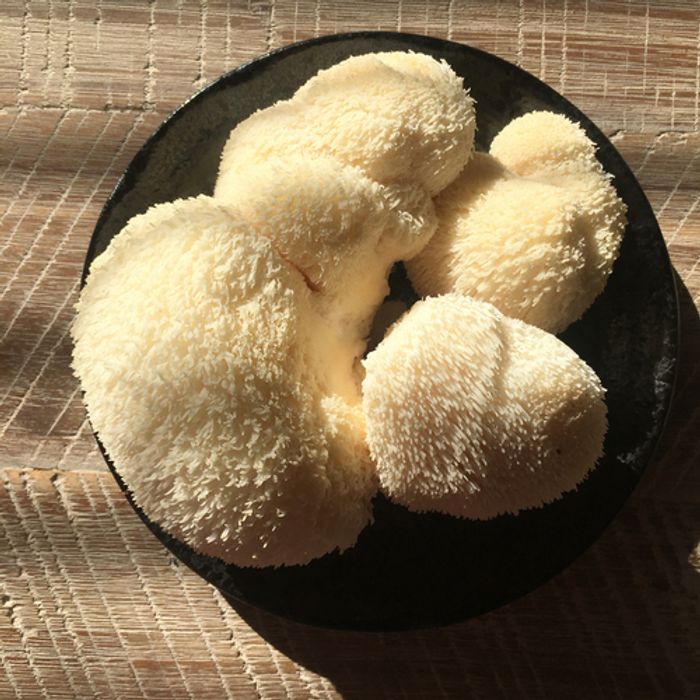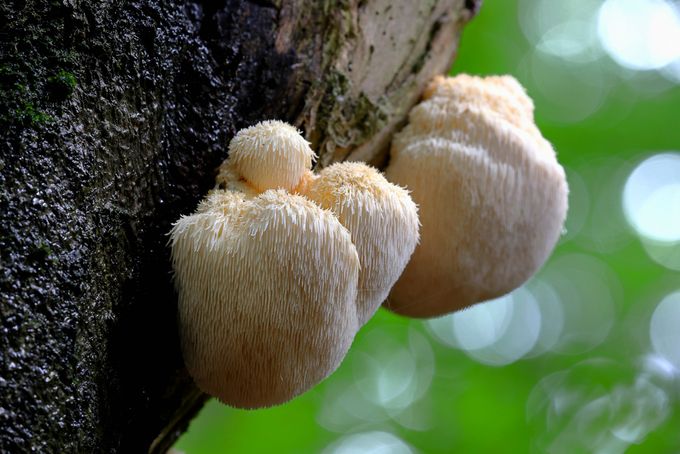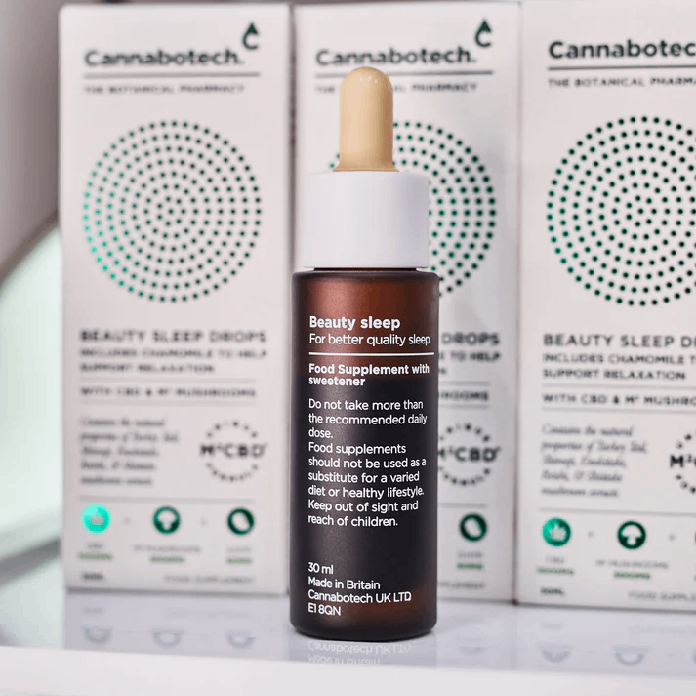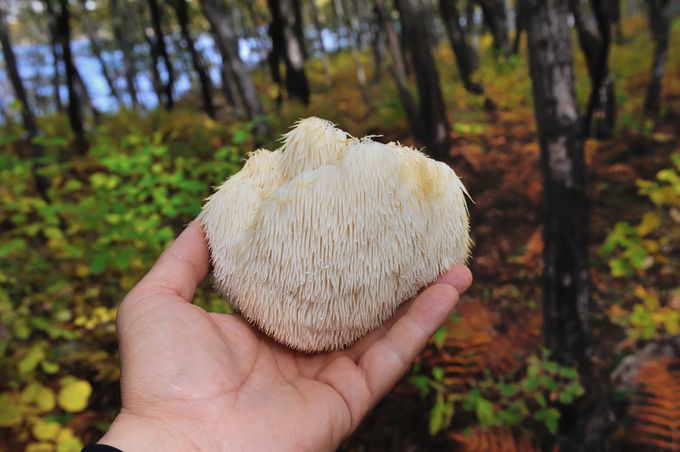Lion’s Mane Mushroom Side Effects
Updated January 8, 2024.

Lion's Mane mushrooms are rich in vitamins such as thiamine, riboflavin, and niacin. It's also a good source of essential minerals such as manganese, zinc, and potassium. In addition, Lion's Mane mushroom is known to improve cognitive function, memory, and overall brain health, and for its anti-inflammatory and immune-boosting properties. Additionally, functional mushrooms like Lion's Mane (Hericium rinaceus) have potential benefits, supported by a growing body of evidence.
Conversely, there is a surprising scarcity of research into the potential side effects of functional mushrooms. Currently, no studies have looked directly at the negative effects of long-term Lion's Mane use in humans.
Certain groups should definitely approach Lion's Mane with caution, mostly those with already existing mushroom allergies. Lion's Mane does not reduce sleep quality; it actually improves it.
Let's look at some possible Lion's Mane side effects, and disprove some common misconceptions.
What is The Lion's Mane Mushroom?
Lion's mane mushroom, known scientifically as Hericium erinaceus, is a large, white, shaggy fungus resembling a lion's mane. It's used in traditional Chinese medicine and culinary dishes, noted for its potential benefits for brain health, nerve regeneration, and immune system support.
Does Lion's Mane Have Any Side Effects?
If you have any medical conditions or a history of asthma or allergies, it's advisable to speak to your doctor before trying lion's mane. “Lion's mane is generally well tolerated, but the most common side effects include gastrointestinal discomfort, nausea and a skin rash,” says Dr. Watson.
Overall, Lion's Mane is generally regarded as safe. Yet, certain people and groups in particular may experience side effects which are mostly mild. Here are the most widely reported adverse effects and contraindications:
Decreased Libido
Though uncommon, some men have reported decreased libido from taking Lion's Mane. This occurs possibly due to the mushroom blocking testosterone conversion to DHT (dihydrotestosterone). However, this effect is not widespread, and any side effects typically go away after stopping Lion's Mane use.
Lowered Blood Pressure
There is some evidence that Lion's Mane mushroom has a hypotensive effect, which means it can lower blood pressure. This effect, however, is typically mild and is not associated with fainting or other serious adverse effects.
Allergic Reactions
One of the most commonly reported side effects are difficulty breathing and skin rashes. If you are one of the few people who experience these after consuming Lion's Mane mushrooms or any variation of their extracts, there's a high chance you're allergic to mushrooms. The experienced allergic reactions will be similar to most other mushroom allergies with minor symptoms such as the following:
- Swelling of the lips, mouth, and airways
- Difficulty breathing
- Skin rashes or hives
- Runny nose
- Watery eyes
- Nausea and vomiting
- Stomach cramping or bloating
- Diarrhea
4 Lion's Mane Mushroom Myths Dispelled
Lion's Mane comes in the form of powder extracts, supplements (capsules and pills), tinctures (drops), and teas. You can also add fresh Lion's Mane to meals, as it has great taste. The benefits and side effects of these product types are largely the same. The only difference between that matters is bioavailability.
With that matter resolved, let us proceed to debunk various misconceptions surrounding this remarkable therapeutic fungus.
1. Lion's Mane Won't Affect Your Dreams Negatively
The reason for this belief is due to the positive effects that Lion's Mane seems to exhibit on REM (rapid eye movement) sleep. REM sleep is the stage of the sleep cycle where individuals typically dream, so a more active REM sleep would likely lead to more vivid dreams. However, the REM stage is very important, as it gives the brain the energy it needs to function during the day and is required for mental restoration.
Award-winning Beauty Sleep Drops by Cannabotech promote restful sleep by positively affecting the REM stage. This unique formula combines high-quality CBD, Lion's Mane mushroom extract and other natural ingredients to enhance relaxation, and improve sleep quality for a more rejuvenating night's rest.
- Helps improve the quality of your sleep
- A blend of Lion's Mane and 2 types of functional mushrooms
- Contains natural ingredients and pharmaceutical-grade hemp extract
2. Lion's Mane Is Not Addictive
Unlike many pharmaceutical drugs, Lion's Mane mushrooms and their extracts don't directly stimulate or inhibit hormone release. So since you can't necessarily build up a chemical dependency or suffer tolerance withdrawal, the risk of addiction is incredibly low.
3. Lion's Mane Won't Make You Trip
People often relate the term "functional mushroom" to the negative connotations associated with the illicit psilocybin fungus, colloquially referred to as "magic mushrooms".
However, there are significant differences between these two types of fungus. Despite their distinct, fluffy pom-pom look, Lion's Mane does not have psychedelic properties. It won't cause hallucinations or get you "high".
4. Lion's Mane Is Unlikely to Cause Headaches
Not only there is no evidence that Lion's Mane will cause you headaches, but preliminary research suggests the complete opposite. The anti-inflammatory and antioxidant properties of Lion's Mane mushrooms are thought to help reduce inflammation and oxidative stress in the body, both of which can contribute to headaches. In one study, an extract of Lion's Mane mushroom was found to reduce the frequency and severity of migraines in rats.
Does Lion’s Mane Have Any Negative Interactions With Other Drugs?
Unfortunately, here the research becomes really scarce. There are no known interactions between Lion's Mane mushrooms and any pharmaceutical drugs, nor with other types of functional mushrooms. Some people prefer to mix different functional mushroom varieties as they believe the effects compound. In contrast, others think that the effects are diminished and that you should instead stick to one type that targets your specific symptoms.
There is no definitive answer on this topic as the debate is still ongoing, but you should always exercise caution when taking new substances if you are on prescription medication.
Is Lion's Mane Safe or Dangerous?
Researchers and many others are confident that the benefits far outweigh the very low risk that these mushrooms present.
If you don't have a mushroom allergy, there is even less risk of adverse effects.
That being said, there are precautions that need to be taken by certain individuals, including:
- Those with bleeding disorders
- Diabetics
- Those expecting surgery soon
Additionally, it's advised that pregnant women and breastfeeding mothers should avoid functional mushrooms entirely. There aren't any studies that suggest Lion's Mane mushrooms to be particularly dangerous for these women, but none have looked at the safety of this fungus in these cases either. As such, it's better to err on the side of caution and avoid functional mushrooms altogether.
If you aren't sure of your own predisposition, or if you are on prescribed medication, you should consult your doctor before deciding to incorporate these mushrooms into your life.
Reap the benefits of Lion's Mane with our scientifically proven Lion's Mane Mushroom Supplements.
How does Lion's Mane mushroom make you feel?
The medicinal mushroom lion's mane is non-psychoactive and does not cause intoxication. It is promoted for its potential to enhance focus and is linked with diminished symptoms of depression. However, more thorough human research is needed to fully understand its effects.
Is Lion's Mane addictive?
You may notice a reduction in brain fog and a slight improvement in symptoms related to anxiety or depression, but lion's mane does not induce a high. It is neither a stimulant nor addictive, and it does not possess psychedelic or sedative properties.
How do you know if a Lion's Mane Mushrooms is bad?
As lion's mane mushrooms mature, they start to yellow. Trimming off the yellow sections can help maintain their taste. If they become orange, feel soft or slimy, or exhibit rot signs, they should be discarded. Stored correctly, fresh lion's mane typically remains good for up to a week in the refrigerator.
Is Lion's Mane Illegal?
Cultivating lion's mane mushrooms isn't against the law, but gathering them from their natural habitats is prohibited. This mushroom is among the most stringently protected species in the country. Its limited availability in supermarkets or farmer's markets is mainly due to its brief shelf life after being harvested.
Conclusion
While lion's mane mushroom has gained traction for its potential cognitive benefits, misinformation surrounding its side effects can be prevalent. Here are additional myths about lion's mane mushroom side effects, and how these are dispelled.
Myth #1: Lion's Mane is Highly Toxic and Dangerous
Fact: While any mushroom can cause an allergic reaction in sensitive individuals, lion's mane is generally considered safe for most people. Studies haven't shown any serious adverse effects, even at high doses in animals. The reported side effects are usually mild and transient.
Myth #2: Everyone Experiences Side Effects with Lion's Mane
Fact: The truth is, many people tolerate lion's mane just fine. The most common side effects like mild digestive issues occur in a minority of users. Individual sensitivity plays a crucial role, and starting with a low dose and increasing gradually can help minimize the risk.
Myth #3: Lion's Mane Induces Hallucinations and Tripping
Fact: This stems from confusion with psilocybin-containing mushrooms. Lion's mane doesn't have any psychoactive properties. Its effects are focused on cognitive function and nerve growth, not mind-altering experiences.
Myth #4: Lion's Mane Causes Permanent Addiction or Dependence
Fact: There's no evidence to support this claim. Lion's mane doesn't contain any addictive substances. The potential benefits primarily arise from its neurotropic and immune-modulating properties, not any dependence-inducing mechanism.
Myth #5: All Lion's Mane Products Have the Same Side Effects
Fact: Quality and preparation matter. Choosing reputable brands and using extracts or powdered preparations standardized for specific compounds can potentially reduce the risk of side effects associated with impurities or contaminants.
Remember: When it comes to supplements, do your research, start low and go slow, and prioritize proper sourcing. If you experience any concerning side effects, discontinue use and consult your doctor.
By debunking these misconceptions about lion's mane side effects, and approaching lion's mane with responsible awareness, you can navigate its potential benefits and side effects more effectively. Let's promote informed, evidence-based discussion around this intriguing mushroom and its role in well-being.
Check out our complete lion's mane mushroom supplements collection.














